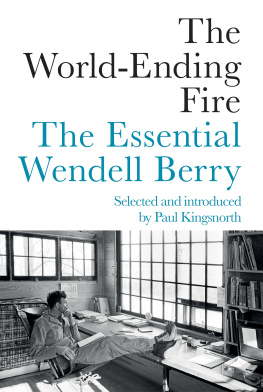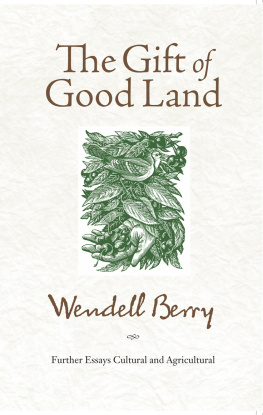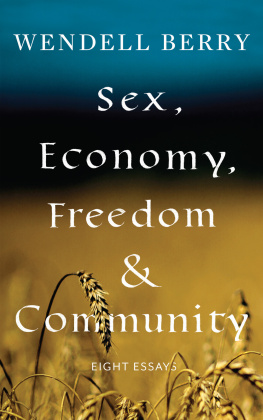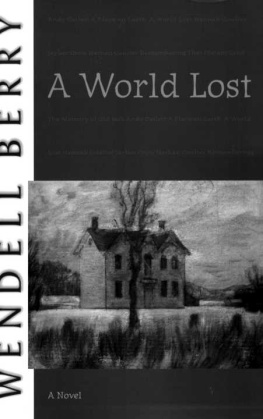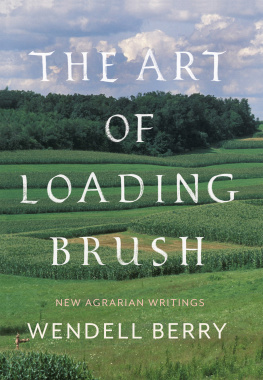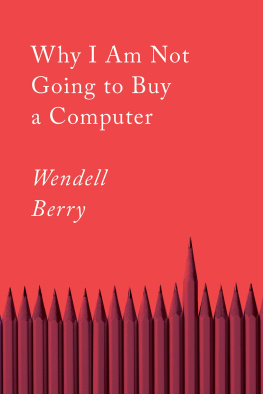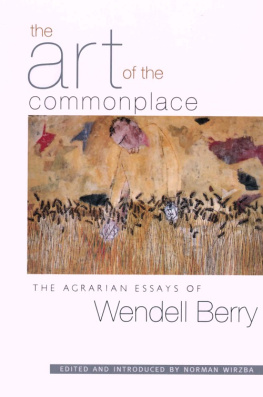
The World-Ending Fire
ALSO BY WENDELL BERRY
The Art of Loading Brush
Another Turn of the Crank
The Art of the Commonplace
Citizenship Papers
A Continuous Harmony
The Gift of Good Land
Harlan Hubbard: Life and Work
The Hidden Wound
Home Economics
Life Is a Miracle
The Long-Legged House
The Poetry of William Carlos Williams of Rutherford
Recollected Essays: 19651980
Sex, Economy, Freedom and Community
Standing by Words
The Unforeseen Wilderness
The Unsettling of America
The Way of Ignorance
What Are People For?
The World-Ending Fire
The Essential Wendell Berry
Selected and with an Introduction by Paul Kingsnorth
COUNTERPOINT
BERKELEY, CALIFORNIA
The World-Ending Fire
Copyright 2017 by Wendell Berry
Introduction copyright 2017 by Paul Kingsnorth
First published in the UK in 2017 by Allen Lane, an Imprint of Penguin Books
First Counterpoint edition: 2018
The acknowledgments on pp. 34951 constitute an extension of this copyright page.
Lines from The Island, from Collected Poems by Edwin Muir, are copyright Willa Snyder 1960, reprinted by permission of Oxford University Press; lines from The Host, from Pictures of Breughel and Other Poems by William Carlos Williams, are copyright 1955, reprinted by permission of New Directions Publishing Corporation; lines form Above the City, from Poems New and Selected by James Laughlin, are copyright 1996, reprinted by permission of New Directions Publishing Corporation.
Jacket photograph by James Baker Hall: Wendell Berry, Forty Panes, Henry County, Kentucky, 1970s.
All rights reserved under International and Pan-American Copyright Conventions. No part of this book may be used or reproduced in any manner whatsoever without written permission from the publisher, except in the case of brief quotations embodied in critical articles and reviews.
Library of Congress Cataloging-in-Publication Data
Names: Berry, Wendell, 1934 author. | Kingsnorth, Paul, 1972 writer of introduction.
Title: The world-ending fire : the essential Wendell Berry / selected and introduced by Paul Kingsnorth.
Description: First Counterpoint edition. | Berkeley, CA : Counterpoint Press, 2018.
Identifiers: LCCN 2017060544 | ISBN 9781640090286
Subjects: LCSH: AgricultureUnited States. | Farm lifeUnited States. | Authors, AmericanKentucky. | Sustainable agricultureUnited States. | Sustainable agricultureIndustrial capacity. | AgricultureMoral and ethical aspects.
Classification: LCC PS3552.E75 W66 2018 | DDC 818/.5409dc23
LC record available at https://lccn.loc.gov/2017060544
Jacket designed by Nicole Caputo
COUNTERPOINT
2560 Ninth Street, Suite 318
Berkeley, CA 94710
www.counterpointpress.com
Printed in the United States of America
Distributed by Publishers Group West
1 3 5 7 9 10 8 6 4 2
Contents
Introduction
In tribute to Wendell Berry, I am writing this introduction longhand, in pen, in a small hardback notebook. It seems appropriate. Berry has never upgraded his writing tools from a pencil even to a typewriter, let alone to anything more complex, as he explains in his short but high-impact essay Why I am Not Going to Buy a Computer (pp. 23643). As with all his decisions, this one seems to have been taken after a good deal of thinking. In his writing, as in his farming, Wendell Berrys readers get the impression that this man does not do anything lightly, and that he chooses his words as carefully as his actions.
With that in mind, and now that I think about it, I see that he would probably take issue with the way I have just lazily used the word upgraded. Not just because of the words ugliness, but because of its implication: that a pencil is a lesser tool than a laptop, simply because it is older and less complex. Older and less complex, in Berrys world, are often virtues. Now in his eighties, he still uses horses to work his Kentucky farm, not for the nostalgia value but because horses do a better job than tractors, and are more satisfying to work with, as he explains in Horse-Drawn Tools and the Doctrine of Labor Saving (pp. 1529).
As with all thinkers who choose to set their face against both fashion and power, Wendell Berry is regularly caricatured for the crime of thinking things through accused of living in the past, wanting to turn the clock back and various other predictable insults grabbed at random from the progressive toolbag. From one angle he can certainly appear, as he acknowledges himself, a relic from the past. Born at the height of the Great Depression into a farming family which, like all its neighbours, still worked their land the preindustrial way, he is a unique figure in modern American letters. Brought up as a farmer, he left the land as a young man to study and travel, eventually moving to New York City to be a writer. Writers, then as now, in the long shadow of Modernism, were supposed to ensconce themselves in the metropolis and live as placeless chroniclers of its unease.
But it wasnt long before Berry felt drawn back to rural Kentucky, where he had grown up. The place was pulling him. Places, in my experience, often do that. I think that some places want writers to tell their stories. Wendell Berry was never meant to tell the stories of New York City; there were quite enough people doing that already. So, as his fellow scribes looked at him aghast, some of them trying to persuade him of his foolishness, he left the city and went back to the land, buying a farm five miles from where he had grown up, in the area where both his mother and father had grown up before him. This is the place in which he has lived, worked and written for the last half-century. This is the place whose story he has told, and through it he has told the story of America, and through that the story of modern humanity as it turns its back on the land and lays waste to the soil.
Soil is the recurring image in these essays. Again and again, Berry worries away at the question of topsoil. This is both a writers metaphor and a farmers reality, and for Wendell Berry, metaphors always come second to reality. No use talking about getting enlightened or saving your soul, he wrote to his friend, the poet Gary Snyder, in 1980, if you cant keep the topsoil from washing away. Over the last century, by some estimates, over half the worlds topsoil has been washed away by the war on nature that we call industrial farming. We may have perhaps fifty or sixty years of topsoil left if we continue to erode, poison and lay waste to it at this rate. As the human population continues to burgeon, the topsoil in which it grows its food continues to collapse. It is perhaps the least sexy environmental issue in the world, but for the future of human civilization, which continues to depend upon farmers whether it knows it or not, it may be the most important.
Wendell Berry knows this, because he sees it every day, and because he works with it. I have spent the last several months reading every book of essays he has ever published, and the image which has stayed with me above all others comes at the beginning of his 1988 essay The Work of Local Culture (pp. 10318). An old galvanized bucket hangs on a fence post near a hollow, in a wood on what was once his grandfathers farm. In the bucket, slowly and over many decades, soil is being born:
The old bucket has hung there through many autumns, and the leaves have fallen around it and some have fallen into it. Rain and snow have fallen into it, and the fallen leaves have held the moisture and so have rotted. Nuts have fallen into it, or been carried into it by squirrels; mice and squirrels have eaten the meat of the nuts and left the shells; they and other animals have left their droppings; insects have flown into the bucket and died and decayed; birds have scratched in it and left their droppings and perhaps a feather or two. This slow work of growth and death, gravity and decay, which is the chief work of the world, has by now produced in the bottom of the bucket several inches of black humus. I look into that bucket with fascination because I am a farmer of sorts and an artist of sorts, and I recognize there an artistry and a farming far superior to mine, or to that of any human.
Next page
